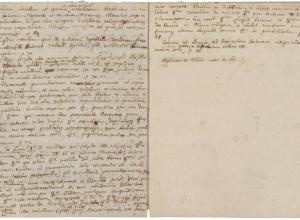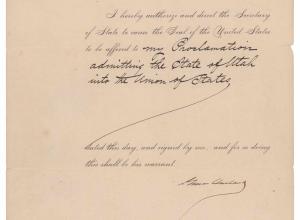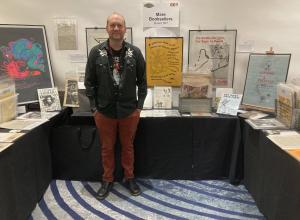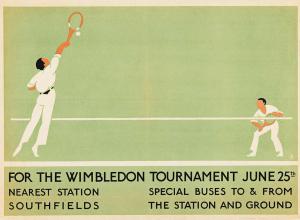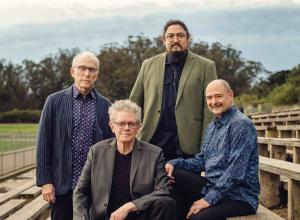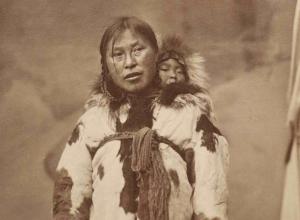Bright Young Librarians: Sara Sterkenburg

Early into college I grew enamored with how histories have been expressed visually in different cultures and times. By that I do mean art and architecture, but also the design of newspapers and typefaces, fashion, film, political symbols, and how the technology and politics of the time drove these processes. I knew I wanted to work with art or special collections right away. But it wasn't until I spent a summer during graduate school digitally archiving and cataloging a newspaper and ephemera collection at the Museo Nacional de Arte in La Paz, Bolivia that I knew I more specifically I wanted to describe them. That role was the most challenging one I've ever had, made increasingly difficult by a cataloging language barrier, technology gap, and short timeline. But in the end, the access to these materials was immediately and measurably heightened. After that experience I took on a lot of similar opportunities with unique collections, particularly those that involved working with metadata or taxonomy development. I enjoy every moment of it!
Where did you earn your advanced degree?
I hold a Master of Science in Information (MSI) degree from the University of Michigan's School of Information.
What is your role at your institution?
My official title at Vanderbilt University is Cataloging and Exhibition Services Librarian. The position itself is actually split 50/50 between two distinct types of work, but I wear a lot of hats - most of them involve wrangling metadata in some capacity. On one side I am the cataloger for our non-archival materials in the Special Collections Library. This typically means rare, fine press books, and artists' books. But it can also mean video, audio, music, ephemera, objects, or maps.
The other side of my job involves working with an amazing team on exhibit design in our libraries. My main responsibility is to handle metadata creation and input for our program. I work with our curators pretty directly, explaining the schema we use for our program (VRA Core 4.0) building documentation around that, and helping them to identify as much information as we can about each artifact using terminology and fields allowed by the schema. We are fortunate to have not only physical exhibition space, but also online exhibits and some very cool interactive touchscreen monitors in our libraries. These enable us to offer high-resolution images and more expansive metadata to supplement the physical cases and make the exhibit as a whole more interactive and impactful for our campus and community.
On your website you mention an interest in "systems, access, and high-fidelity metadata." Could you tell us more about this and how it relates to cataloging rare books?
When I work with rare books I think, deeply, about what someone would be looking for in that object, and I describe it and record it with that in mind. There is a huge responsibility in assigning metadata - but especially so with rare items: we may be the only institution who has it, and I may be the only person who ever describes it, so it's important that it's done right. I work very hard at that every day. But beyond cataloging, the system that houses a record must be equally robust and flexible, and its design must make sense to the people using it. Making sure, for example, transliterated titles display correctly in a catalog system and the library website isn't always easy. Access problems like this happen long before a user touches a book or downloads a journal article. I care about these things because I realize the path to access and scholarship isn't always straightforward. In the digital age, we have to be aware of every facet of the discovery process in order to do justice to the small parts of it that fall in our lap.
Favorite rare book / ephemera that you've handled?
That's a hard question. Can I cite one type of thing rather than a single book? Perhaps because I love modern and post-modern art, I'm interested in books that beg the question: "is this even a book?" Dealing with describing resources that aren't sure what they are is a wholly separate issue, but I love it when people push conceptual boundaries with their craft.
What do you personally collect?
I'm afraid to say I'm more of a dabbler or sampler than devoted collector. I have an interest in weird book ephemera that I'm starting to hone more and more - maybe I'll turn that into a Tumblr someday. But like many of my peers who have been interviewed for this series, I pretty much prefer to keep the collecting at my institution and not at home, where the materials represent far more interesting people!
What excites you about rare book librarianship?
As someone who works with creating and refining metadata for a living, I am of course interested in semantics and providing greater access to rare materials. But, in coming from an information science graduate program rather than a traditional library science curriculum, I was raised as a librarian in coursework grounded by design, data analysis, user experience studies, and digital preservation. So, I truly value having a technology tool-belt. And I think that with all types of librarianship that's a growing necessity. For rare books, there's a constant battle between these materials that are so fragile and innately historical, and the rapidly increasing user demand for digital access in new, increasingly innovative and flexible ways. User demand, luckily, often drives funding, so there is opportunity for grants and support on digital projects for primary resources. It's an exciting time to be a young rare books librarian. New skills are continually required to keep up with this remarkably intelligent field, so I definitely keep one foot in the print universe and one in the digital, and I very much love living in that intersect.
Thoughts on the future of special collections / rare book librarianship?
The future is very bright! It shouldn't be a surprise that growth in the management of rare books and special collections is becoming more and more digitally focused. I am seeing fascinating projects coming out of so many different institutions. As the digital humanities expand, we are seeing desire for the re-use and repurposing of data, as well as the creation and extraction of new types of data from our collections. I think we will especially see collaboration with international bodies to digitize rare materials that haven't previously been accessible across borders.
I am particularly interested in seeing where the future takes us with new schema and more robust metadata for rare collections, because I think that will really be the foundation that paves the way for our institutions to continue exploring data curation and big data concepts. I see future projects requiring new types of information professionals in our institutions who are equipped with data mining and programming knowledge and can work with developers to use frameworks like Hadoop to query our metadata and extract new knowledge from our rare materials. This will undoubtedly translate to more interdisciplinary data comparisons, and working with people who used to operate in different silos, but now value cross-pollination from other fields and industries.
Any unusual or interesting collection at your library you'd like to draw our attention to?
Yes! Vanderbilt University is home to the Television News Archives, which is the most extensive collection of television news in the world! For books, we have an impressive and growing collection of artists' books - including a large amount of Claire Van Vliet and Barry Moser's works, all of which have beautiful craftsmanship. In our archives I would point to the James M. Lawson, Jr. Papers, which cover the Civil Rights Movement, include James Earl Ray correspondences, and document much of Reverend Lawson's activities: including fighting for gay rights, prisoners' rights, and for basic equality for more than sixty years.
![]()







